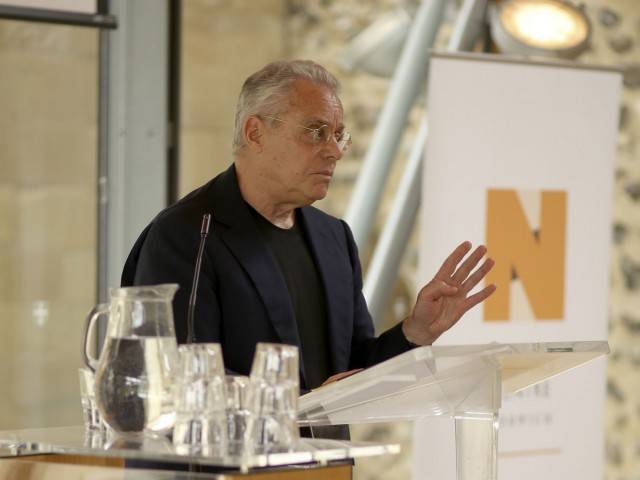From the Butcher Shop to Cambridge University: Dan Burt’s Exceptional Journey

‘Prostitution, gambling, fencing, contract murder, loan sharking, political corruption and crime of every sort were the daily trade in Philadelphia’s Tenderloin, the oldest part of town. The Kevitch family ruled this stew for a half a century, from Prohibition to the rise of the Atlantic City. My mother was a Kevitch.’ – Dan Burt, You Think It Strange
By SB Veda
Poet, author, lawyer and entrepreneur, Dan Burt gives us glimpses into his fascinating journey from working in his father’s butcher shop in the crime-ridden ‘Tenderloin’ area of Philadelphia to reading English at Cambridge university as chronicled in his memoir, You Think It Strangee. He also talks about his return to the USA to practice law, and subsequent self-imposed exile from the country of his birth and upbringing.
I consumed Mr. Burt’s memoir after hearing him read his angry poetry at Worlds Literary Festival in Norwich, England. His words resonated inside of me, and I asked him to do our first transnational ‘Calcuta Conversation’. For my review of You Think It Strange, please click on the following link: Dan Burt – You Think It Strange.
Part 1
We begin with a reading of several sections from his memoir while I listen, engrossed, not needing to interrupt. True to the form of ‘Calcutta Conversations’ the discussion unfolds naturally – and Mr. Burt tells his story in a gripping manner.
Mr. Burt’s narrative sequences, are followed by my asking him about his father and the sea. His father was a butcher and amateur boxer whose ‘fists rose at the slightest provocation against all comers and sometimes against me (Dan Burt)’. His relationship with his father was complex. His father had compelled him to work in his father’s butcher shop from age 12, essentially stealing from him a childhood, something which his brother did not have to do. We close with his mentioning the distinction, which leads into part 2.
Part 2.
We open with the poem, ‘Slowly Sounds the Bell,’ as read by Dan Burt. It is a piece on the death of Dan Burt’s estranged brother and the feelings he had around this relationship. He describes a relationship with disparities of a Biblical nature. Dan’s brother was ashamed of his background – so much so, that it was only at his funeral that many of his WASP colleagues at Bechtel, where he was general counsel, learned of his Jewish ancestry.
Having mentioned to me previously that he was an atheist but of Jewish ethnic identity, his brother was ostensibly a member of the Unitarian Church – which was more about clouding his origins than practicing a religion. Unlike his brother, Dan Burt knew he could not fit in American society. He was not one of them. It was this sense of being ‘the other,’ that caused him to leave.
Part 3
We pick up on the theme of culture and society in this part discussing the ‘Melting Pot’ vs. ‘Multi-cultural’ models of immigration: why Dan feels more comfortable in Britain than the USA.
We talk about academic life and his return to the US, his wanting to show people, he could make it in America. We agree this is a common mythology of nations in the ‘New World’ – that immigrants must feel a sense of obligation on becoming what is described to them invariably as ‘the greatest country in the world’ – a place to make a new beginning, ‘a land of opportunity’. In the end, he could not conform to the stereotypical monolithic American.
Part 4
Dan Burt reads three very different poems in this segment, demonstrating his lyrical range. In the first, Ishmael, we get a taste of meat in the butcher shop but from a safe distance, thankfully. Still, it makes one look at meat differently!
‘Little Black Dress‘ is a delightful and insightful quip of a poem about romance being ravaged by time, and boiling passions, simmered and left to cool. His last poem in the series, ‘Who He Was – 5‘ is a sentimental poem on his love of the sea, which is the legacy that his father gave him. Despite all the turmoil, being made to work as a child in a butcher shop, the beatings, he still reflects, ‘How could you not care for a father who gave you that.’
Part 5
In this segment, I ask Dan about whether with the memoir done, he sees his parents as human beings, now, themselves products of their initiation to this world. He talks about the importance of the first windows of experience, and how they reflect on the remainder of a life. Lastly, he reflects on what is most important to him with characteristic emotion and humour.
For the poems of Dan Burt, click on: Dan Burt Poetry
 The Global Calcuttan Magazine
The Global Calcuttan Magazine
I really enjoyed this interview. Looking out for his book (memoir) in the USA. Where can I buy his poetry?
Where can I get the book? I’m located in Brazil.